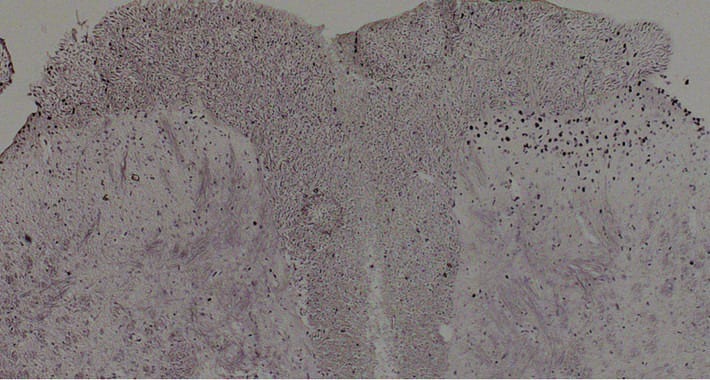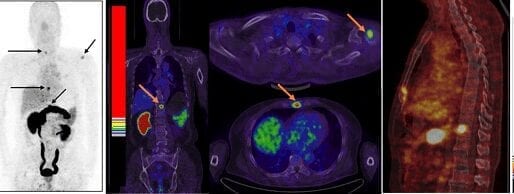
One of the outstanding issues of modern medicine is to combat pain effectively. Jose Vicente Torres Pérez, a Spanish researcher who works at Imperial College in London, set out to curb the suffering of people with serious burns.
Torres found that blocking a new genetic marker can reduce the neural activation caused by painful stimuli.
As Torres, the only Spanish researcher participating in the study published today in the journal ‘Scientific Reports’, explains to SINC: “The cell activation markers most used today are pERK1/2 and c-Fos, but both have their limitations.”
The development and persistence of pain depends on plastic changes to the neurons that process information on noxious stimuli, which are those of the dorsal spinal cord.
These plastic changes are largely regulated by epigenetic mechanisms, i.e. chemical changes that alter the expression of the genes, but not their sequence, such as post-translational modifications of histones.
“Seeking new pain markers continues to be very important in the field of nociception, which analyses the subjective experience of pain, and a need that has not yet been met,” adds Torres Pérez.
New pain relief therapy
Technically, the team in which the Spanish expert works has demonstrated in mice that a population of superficial neurons in the spinal cord controls an epigenetic marker known as pS10H3.
“We observed the effect after using various animal pain models: inducing burns, applying capsaicin or electrical nerve stimulation,” explains Torres Pérez. Therefore, the authors believe that, if this activation is blocked, they will achieve a new pain relief therapy.
For the Spanish researcher, “pS10H3 is a new marker of pain processing in neurons on the spinal cord, and the changes caused by it are fundamental to normal pain development, which opens up new therapeutic possibilities.”
Application to burn victims
Recent advances have significantly increased the survival rates of burn victims, but little has been achieved to alleviate the pain they suffer.
According to the authors, advances that help to decipher the molecular mechanisms produced in neurons that are key to processing pain – such as the discovery of this alteration – will help to find new therapeutic strategies.
“We propose that blocking this epigenetic modification could be a new strategy to try to reduce or completely eliminate the pain after these processes,” Torres Pérez concludes.
[osd_subscribe categories=’Epigenetics’ placeholder=’Email Address’ button_text=’Subscribe Now for any new posts on the topic “EPIGENETICS”‘]
Receive an email update when we add a new EPIGENETICS article.
The Latest on: Epigenetics
[google_news title=”” keyword=”Epigenetics” num_posts=”10″ blurb_length=”0″ show_thumb=”left”]
via Google News
The Latest on: Epigenetics
- Your Grandparents' Diet Could Still Be Affecting You, And Your Kids' Healthon April 27, 2024 at 4:31 am
In short, nutritional epigenetics is the study of how your diet, and the diet of your parents and grandparents, affects your genes. As the dietary choices a person makes today affects the genetics of ...
- Nu.Q® Vet Cancer Test launched in-clinic in U.S. and Europe through Antechon April 23, 2024 at 5:00 am
VolitionRx Limited (NYSE AMERICAN: VNRX) ("Volition"), a multi-national epigenetics company, has announced that its Nu.Q® Vet Cancer Test is now available in-clinic to veterinarians across the U.S and ...
- Max Planck Institute of Immunobiology and Epigeneticson April 19, 2024 at 4:04 pm
The scientists at the Max Planck Institute of Immunobiology and Epigenetics focus on the development and functioning of such strategies. They examine how the immune system emerged in the course of ...
- Success Beyond Destiny: How Epigenetics Challenges The Law Of Attraction In Businesson April 17, 2024 at 4:30 am
The growing field of epigenetics reveals that your DNA carries echoes of your ancestors' experiences—echoes that can shape the map of your life, including your career.
- Social status changes hyenas’ epigeneticson April 14, 2024 at 11:19 pm
Yes! I want to get the latest chemistry news from C&EN in my inbox every week. ACS values your privacy. By submitting your information, you are gaining access to C&EN and subscribing to our weekly ...
- BIOL.4385 Epigenetics & Chromatinon April 8, 2024 at 3:51 am
Although epigenetic phenomena have been observed for over a century, researchers have only started to untangle their underlying mechanism and effects on gene expression. This course provides and ...
- Epigenetics is of critical importance in autoimmune-related skin diseaseson March 23, 2024 at 5:00 pm
Epigenetic processes partly account for this regulation. Epigenetics is the structural modification of chromosomal areas to record, signal, or maintain changed activity levels. Since the word ...
- Epigenetics in a Dishon February 27, 2024 at 6:25 am
Introduction to Epigenetics and Preliminary Editing Tools Narrator (Charlene Lancaster): Cells often turn gene expression on and off through epigenetic marks. This information is not encoded by the ...
- Epigenetics linked to the maximum life spans of mammals — including uson December 11, 2023 at 8:02 am
Now, scientists propose that "epigenetics" could at least partly explain these differences. They posted their yet-unreviewed findings in November to the preprint database bioRxiv. While "genetics ...
via Bing News










